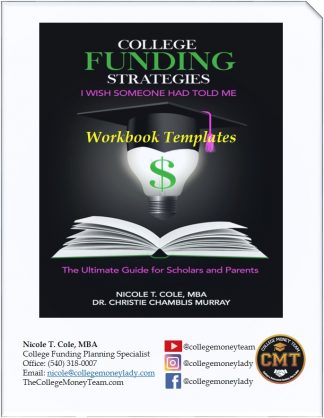
 January is the month that millions of families disclose their financial data to the Department of Education through the Free Application for Federal Student Aid (FAFSA). Specifically, more than 20 million FASFA applications are submitted each year. Depending on the statistic you prefer to use, anywhere from 70—90% are submitted with errors. An error-filled FASFA will likely reduce the amount of aid you might receive. Given that the FAFSA has been called the gateway to financial aid, and with the ever increasing costs associated with college, it is imperative to minimize mistakes in completing it. Here are ten ways to reduce the likelihood of your FAFSA containing errors.
January is the month that millions of families disclose their financial data to the Department of Education through the Free Application for Federal Student Aid (FAFSA). Specifically, more than 20 million FASFA applications are submitted each year. Depending on the statistic you prefer to use, anywhere from 70—90% are submitted with errors. An error-filled FASFA will likely reduce the amount of aid you might receive. Given that the FAFSA has been called the gateway to financial aid, and with the ever increasing costs associated with college, it is imperative to minimize mistakes in completing it. Here are ten ways to reduce the likelihood of your FAFSA containing errors.
1) Failure to Submit Because of Income (high or low) Many times families will not submit a FAFSA believing they make too much money to qualify or they make less and think they will get everything covered because of income. Income is one of seven factors to determine aid eligibility…you should always complete the FAFSA regardless of income.
2) Waiting to Submit A misconception of many is to wait until they have all of their financial documents in place and taxes done before submitting their FAFSA. Since some money is on a first-come, first-served basis, it is imperative to submit as early in January as possible with estimates of your finances which is fully expected.
3) Divorce Situations In this situation, whose financial information is used? It is the income and assets of the household (including step-parent info) in which the student spends the majority of their time and receives a majority of their support.
4) Understating Income If you contribute to a 401K, 403B, etc. or any other pre-tax retirement account, you must add back any contributions in the previous year to your income for FAFSA purposes. This in effect produces a higher FAFSA income than what might be shown on your tax return.
5) Overstating Assets Many families mistakenly include retirement assets as part of their investments or net worth when in fact retirement assets should not be included here.
6) Real Estate Another common way families overstate their assets is by including the equity they have in their primary residence. For FAFSA purposes, primary residence home equity is not included. However, equity in rental property and vacation homes can be included.
7) Misplaced Information Always remember the FAFSA is written from a student perspective as if they are the one completing it. When the FAFSA refers to “you” and “yours”, it is in fact referring to the student.
8) Not Submitting Electronically Online submission provides built-in edits to help prevent errors, is timelier, provides an online help feature, and allows for a much simpler renewal process.
9) Taking Your Time When Answering Questions Give yourself time to think through the questions and what they are asking. Answering questions a certain way can preclude you from receiving aid or valuable information. The following two questions highlight this fact. When asked if you are interested in work study, always answer “yes”. It does not mean you will get it nor does it mean you have to take it. But what if the award is a great offer for the hours expected? When it asks for the student’s email address, always put your email address. This ensures all information communicated to you or your student comes to you to review.
10) Failing to Save as You Go Every couple of pages, be sure to save your file as you go. You don’t want to get halfway through and find your computer or the government’s server has locked up.
And last but not least, we want to include the one mistake you definitely do not want to make. Please be sure to complete the correct FAFSA application. Remember to complete the FAFSA for the year your student will be in college for the upcoming fall school year, NOT the school year you are currently in. This is a huge but common mistake. Make this one and your student will receive no aid for the following school year. Your CPR advisor can help you minimize mistakes with your FAFSA submission so that you maximize your potential aid award.
We are in the business of helping families through the major life transition of sending their children to college. For many, it will be the most expensive time of their lives and, if not handled properly, could cost them their retirement. If you or someone you know needs the help and guidance of a trained financial professional, don’t hesitate to contact your local College Planning Relief® Licensee. Remember, you shouldn’t have to choose between your child’s college and your retirement.







